5 Critical Gaps in PRSA’s (Very) Outdated PR Ethics Code
The Public Relations Society of America (PRSA) routinely spotlights its Code of Ethics as the PR industry gold standard of all-things-ethical that every public relations practitioner should aspire to and every PRSA member must uphold…
Well… sort of, as PRSA’s ethics “code” is actually unenforced — at least on days when the PRSA Board doesn’t think it needs to be enforced.
In general, the PRSA Code of Ethics includes numerous important and highly relevant provisions about things like being honest and accurate; that conflicts of interest are bad; that valuing “the public interest” is good, etc., etc…
However, in the Year 2024, there are major problems with this aging document that merit immediate review. (Page 1 excerpt, below)
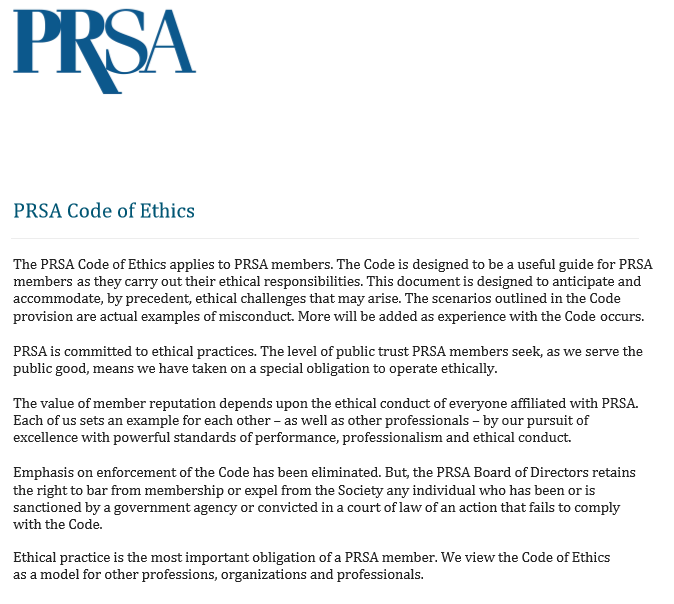
I must preface my criticisms of PRSA with a disclaimer:
I do not have a cordial relationship at all with PRSA, Inc. – specifically due to years of repeated ethical-compliance failures by PRSA’s national leadership, which I reported across many years… all of which essentially were ignored, replete with retaliation. (Whistleblower retaliation by New York State-chartered not-for-profits of PRSA, Inc.’s size and scope is illegal, as defined by New York statute.)
Also, I am a past national board member of PRSA (2002-03) and a past appointed member (ex officio) of PRSA’s Board of Ethics & Professional Standards (BEPS), so my institutional knowledge of this organization is both deep and wide-ranging.
All of that history aside, it’s a widely accepted notion that published ethics codes are important for every industry.
But they’re even more functionally critical for an industry like public relations.
Why?
Because PR practitioners, PR firms, corporate / governmental PR departments, and PR campaigns are unregulated in the U.S. and in most nations of the world (except for some aspects of investor relations, as regulated in the U.S. by the Securities & Exchange Commission).
PR is also an unlicensed field…
…Which means that anyone can claim to be a “PR Professional” on their LinkedIn profile or on a business sign, yet never have attended even one collegiate PR course or certificate program or ethics seminar, nor been accepted into membership of any PR association, or vowed compliance with any ethical standards whatsoever.
In short, PR widely has no compliance function as an industry.
This non-licensure / zero-credential issue matters tremendously to PR leaders and practitioners who are schooled, experienced, credentialed, and ethically dedicated.
It matters because we have to compete for jobs as well as for bandwidth in the marketplace of ideas with other folks who may not hesitate to misuse the tools of PR communication to misinform and mislead, for purposes of self-gain, at odds with the public good.
This situation means that written ethics codes are all we in the PR industry have to set “codified” standards of what we as PR people should do… and, more to the point, what we shouldn’t do… in how we communicate and seek to build trust with diverse audiences.
In filling gaps where government laws / regulations of acceptable professional conduct either cannot or will not mandate the provisions of fair dealing and honest work in PR, ethics codes establish these “rules of the road,” so to speak.
As such, contemporary, published ethics codes for the PR industry should be:
- Current
- Timestamped
- Reflective and supportive of compliance mandates with governmental laws / regulations
- Specific about and consistent with balancing / serving the public good
- Inclusive of logical protections for PR practitioners who report observed misconduct
In my judgment and by way of evidence documented here, the PRSA Code of Ethics includes none of these elements.
I hope that situation will change, for the good of the U.S. PR industry in particular. For the benefit of fostering change, here are some more details about each of these above-mentioned concerns.
- PRSA’s Code of Ethics hasn’t been updated since Bill Clinton was still President of the United States.
According to “PRSA & Ethics: A History of Our Commitment to Integrity and Education,” (Whitman / Guthrie), PRSA unveiled its current Code in 2000.
Way back then, in 2000, PRSA’s Code-update timing was actually quite good, given that the conclusion of that colorful U.S. Presidential administration meant that “ethics” was on everyone’s mind.
But PRSA’s Ethics Code essentially hasn’t been touched for updating, ever since.
This lack of PRSA’s Code undergoing any serious scrutiny, relevancy-review, and update-modifications is a very, very big deal. Or rather… a very, very big embarrassment, considering that PRSA claims publicly to be “the leading professional organization serving the communications community.”
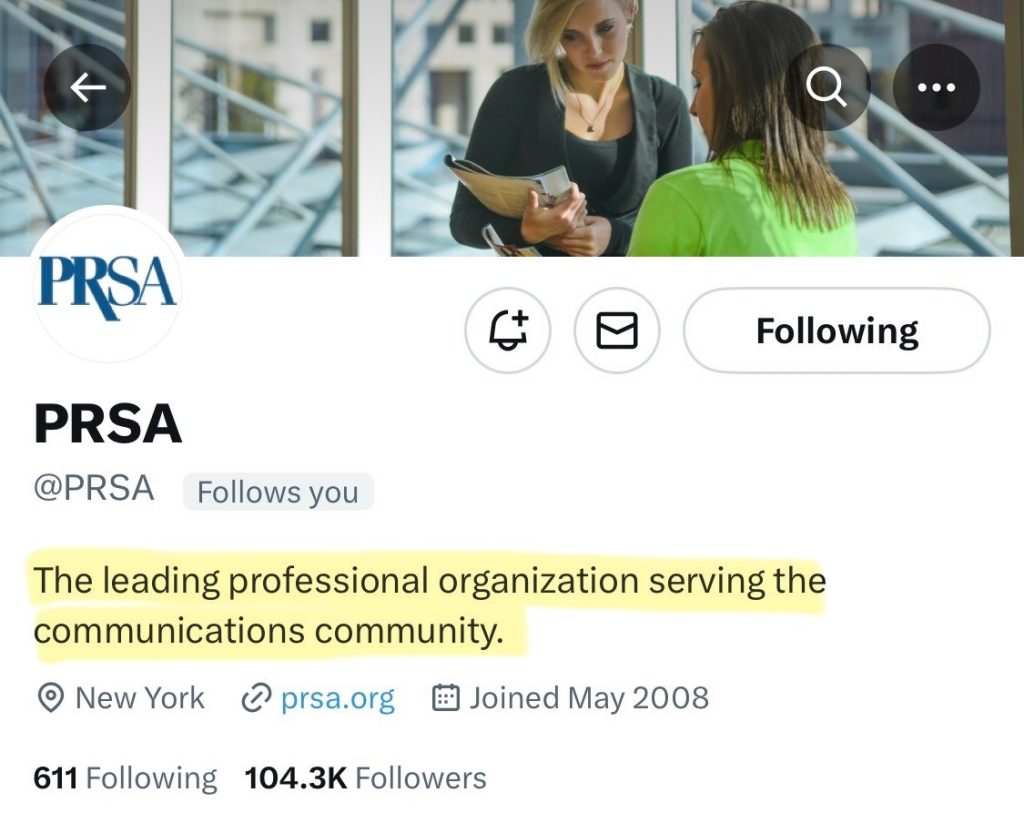
But just how well can PRSA “serve” the communications community, armed with an ethics code that hasn’t been touched since before the dawn of Friendster?
Think about it.
Some two-and-a-half decades of the fast-evolving digital age are now committed to history books. From 2000 to 2024, all the ways that social media and communication technologies alone have impacted PR ethics implications are almost mind-numbing.
To boot, PRSA’s code has never been modified in response to any other major socio-economic, world-order events that have vitally impacted and influenced contemporary issues of communication integrity and public trust.
Consider the post-Enron world (2001), which unleashed Sarbanes-Oxley and ushered the word “transparency” into business and governmental vernacular.
Consider the post-9/11 world (2001)…
…The post-Great Recession world (2007)…
…The post-#MeToo world (2017)…
…The post-George Floyd world (2020)…
…The post-pandemic world (Now)…
All of these major, systemically altering events in U.S. and global society transpired AFTER PRSA’s current Code of Ethics was published.
Yet this Code from the year 2000 remains static in 2024, stuck in an authorship era in which print media still largely reigned supreme and fax machines were still considered standard / essential office equipment.
There are numerous other issues, apart from PRSA’s Code being outdated.
2. The PRSA Code of Ethics also is un-dated – meaning, it carries no timestamp of most-recent update.
Clearly, there’s a reason for that…
In my view, PRSA leadership doesn’t particularly want the public to see how ancient the current Code is, which would be laid bare, if the document sported its accurate date of whatever month in the year 2000 it was adopted, presumably at that year’s Assembly.
Allowing an ethics code to remain with no timestamp fails to conform with modern-day best-practice for any organization.
The Institute of Business Ethics in London, which conducted the study of 24 PR industry ethics codes for my white paper (free to download), “The State of Ethics Codes in the Public Relations Industry: A Global Analysis,” stated in its original report on the topic of “regular updates” for codes:
“Core ethical principles and values in PR are expected to be longstanding. However, even if they do not change, how they are to be applied and the context of application will change.
“The IBE recommends that codes of ethics are revised every three years – and dated accordingly.”
So, if we use the IBE’s independent standard, PRSA’s current Code of Ethics actually should have been updated at least EIGHT TIMES by now… and marked / re-issued accordingly.
In fairness, PRSA isn’t the only organization with ethics-code updating issues. Eighteen percent of other PR associations also have ethics codes that were developed in 2015 or prior.
This graph shows in the aggregate how many other PR association ethics codes of the 24 that the IBE analyzed in 2022 either have or have not been updated in recent memory – if the code document included a timestamp at all:
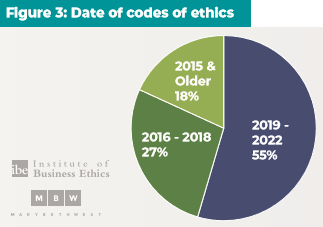
3. The PRSA Code of Ethics does not state that obeying federal, state, and local law is required.
This omission is stark, given the backdrop of PRSA’s recent history.
In years past, most logical folks would presume automatically that obeying government-codified law and ensuring that PR practices do not purposely undercut legal compliance mandates would be a given, right?
No need to interject any other verbiage quite so glaringly obvious into an ethics code, right?
Well, think again.
As it turns out, if legal compliance isn’t manifestly stated as an ethics code provision and a requirement of conduct, then do you know what’s created?
A loophole.
PRSA states in its Code that “the PRSA Board of Directors retains the right to bar from membership or expel from the Society any individual who has been or is sanctioned by a government agency or convicted in a court of law of an action that fails to comply with the Code.”
Talk about loopholes!
According to this rather strange, formal-logic-flawed verbiage, a PRSA member must be convicted not only of “an action” that is “sanctioned” by a third-party government agency or court, but also, that “action” itself must meet an additional “PRSA standard,” so to speak, of “fail(ing) to comply with the Code.”
Otherwise, the PRSA Board claims by default that it won’t necessarily exercise its “right” to take action.
Which begs some strange follow-up questions:
Does murder count?
I ask, because murder isn’t mentioned or treated in the PRSA Code. Need it be?
How about sexual assault? Same reason for the question.
How about racial, sexual, religious, or other forms of workplace discrimination against a protected class, resulting in fines by the EEOC and/or the NLRB?
How about “unlawful sales practices and pressure tactics” that rip off millions of members of the public… and then obfuscating about it in the press, after which the PRSA-affiliated organization (but maybe not an individual PRSA member, personally) is “sanctioned” to the tune of billions of dollars in fines by the Department of Justice?
Of course, this specific example has to do with banking giant Wells Fargo (discussed later in this blog).
Should everyone working in PR for such an unethical organization get the boot from PRSA… or at least be subject to investigation for any role they may have had in manipulating communication about the proven misconduct? After all, Wells Fargo was “sanctioned by a government agency.”
Clearly, in Wells Fargo’s case, the PRSA Board opted instead to shower these people with awards in the years that the Bank’s misconduct was going on.
What precise violations of government law must also pass PRSA muster as “fail(ing) to comply with the Code” to merit accountability?
Further, at what point is PRSA leadership itself culpable for violations of law AND PRSA’s own ethics code?
For example, New York State law requires that state-chartered not-for-profits with the organizational parameters of PRSA, Inc. (which itself is NY-chartered), must report full, 12-month, year-over-year financials annually. New York State statutes are very specific and clear on these required financial data points.
Yet PRSA skirts this law each year by doing nothing of the sort…
Instead, PRSA only reports fiscally nonsensical 10-month (2020) or 11-month (2021-2023) financials to its members – which wouldn’t pass muster in any normal boardroom of reasonably competent executives applying even the most modest scrutiny.
By way of this annual compliance failure with New York law, PRSA, Inc., also violates PRSA’s own Code of Ethics’ provisions for “Free Flow of Information,” “Disclosure of Information” and “Enhancing the Profession,” by purposely hiding and withholding information that members (Assembly delegates) need legally for “informed decision making.”
Maybe it’s time for PRSA’s Board of Ethics & Professional Standards to change the language of the Code to make abiding by government laws a requirement.
I mean, it’s really sad that the non-compliance problems at PRSA (and at certain member companies) have come to that point, but it is what it is.
4. The PRSA Code of Ethics references four times that PR should serve “the public interest,” yet the PRSA Code never states that PR tools must never be used to endanger public health, safety, or wellbeing.
This glaring omission of specificity is also rather a big deal, because guess who are members of PRSA (and/or have been in recent years)?
- Wells Fargo (to which PRSA has heaped awards in recent-past years)
- Boeing (which PRSA actively promoted just a month ago as part of a PRSA group membership campaign)
- The late Jeffrey Epstein’s PR firm (no further comment needed)
And those are just some.
Meanwhile, certain PRSA National “leaders” have barred me from membership, because I keep bringing up these inconvenient facts.
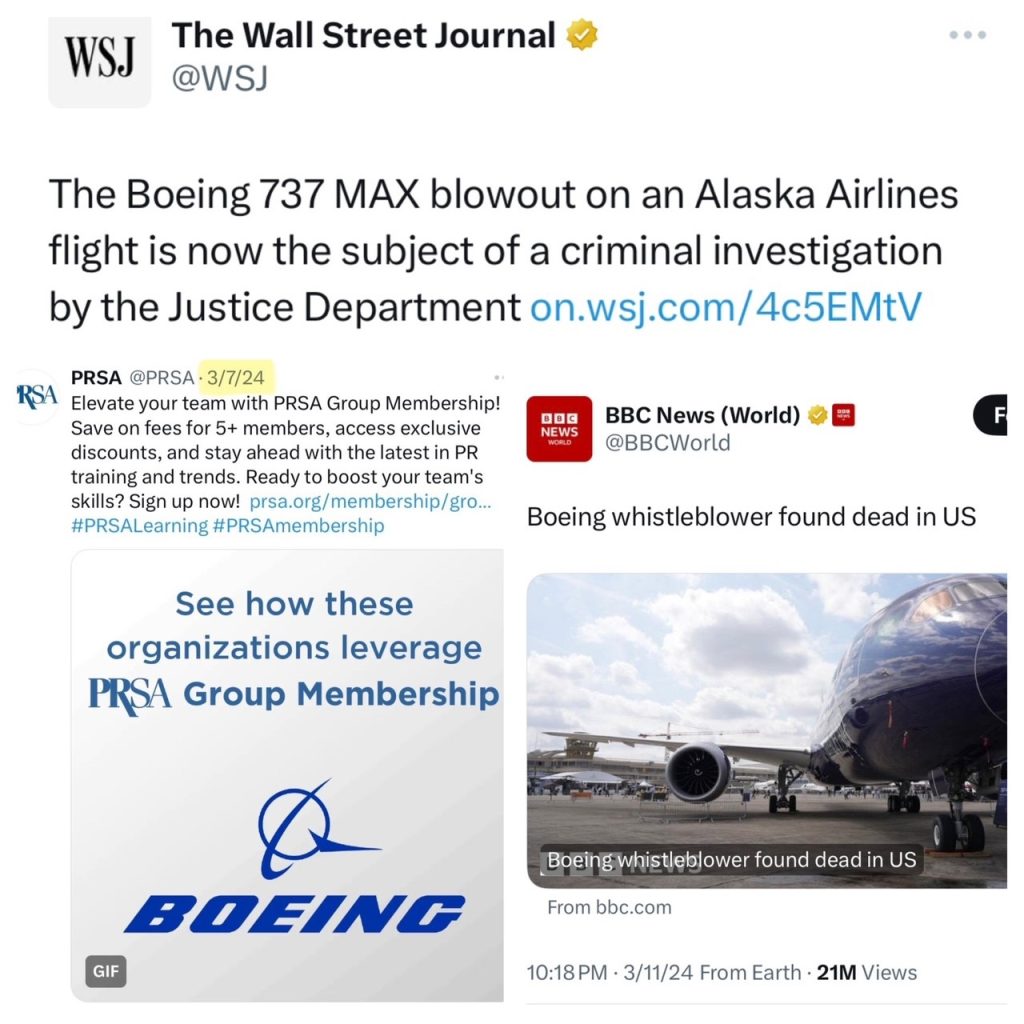
When PR people representing highly compromised management teams subvert truthful communication and instead gaslight the public, spin diversionary messages, and mislead people – even to the extent that the public can be harmed irreversibly – then those PR people can be culpable in serious wrongdoing directly harming “the public interest.”
Yet PRSA’s Code of Ethics only keeps this topic of “the public interest” at arm’s length – with no specifics defined about what “the public interest” even means.
This ambiguity helps keep this phrase open to (very) loose interpretation… and even a looser compliance function.
Case in Point:
PRSA, Inc. presented its 2018 Gold Anvil Award – the Society’s highest individual honor – to a Wells Fargo PR VP and “mentor” to PRSA’s then-National Chair (by the Chair’s own admission), at the 2018 PRSA International Conference podium in Austin, Texas.
As documented in PRSA’s own National Board meeting minutes, this Gold Anvil honoree also personally had fronted Wells Fargo’s paid service contract to manage the PRSA, Inc. investment-portfolio account up until that very year (2018), in a role that no one opted to disclose to the larger membership.
Amid it all, Wells Fargo’s own fake-accounts scandal, which had erupted in 2016, was far from over in 2018.
The scandal reached only one of numerous boiling-points in 2018 and ultimately resulted in Wells paying billions in government fines.
The Wells Fargo management team culture – defended, promoted, and spin-doctored by its “PR” apparatus – also was documented several years later by The Wall Street Journal’s investigative reporting to operate “like a mafia” … eerily similar to treatment I received personally from this Gold Anvil recipient and the 2018 PRSA National Chair (and also by numerous PRSA Chairs who served before and after him).
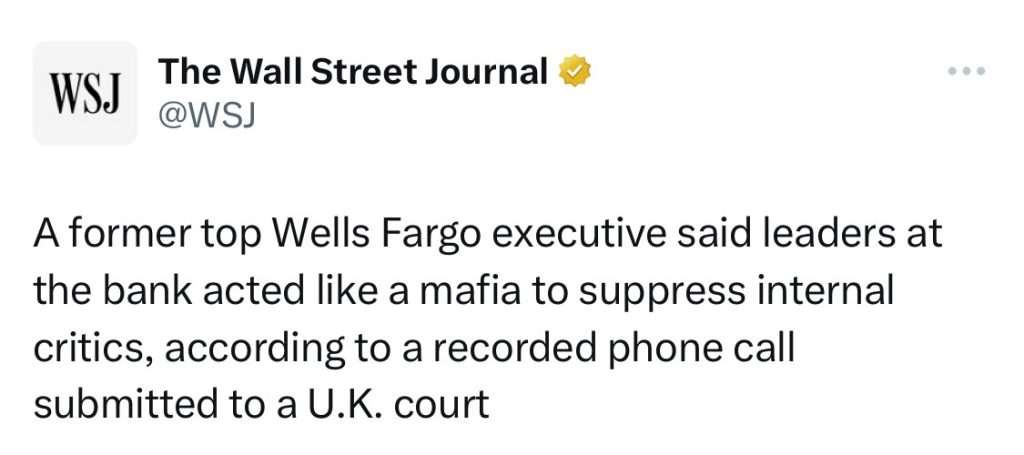
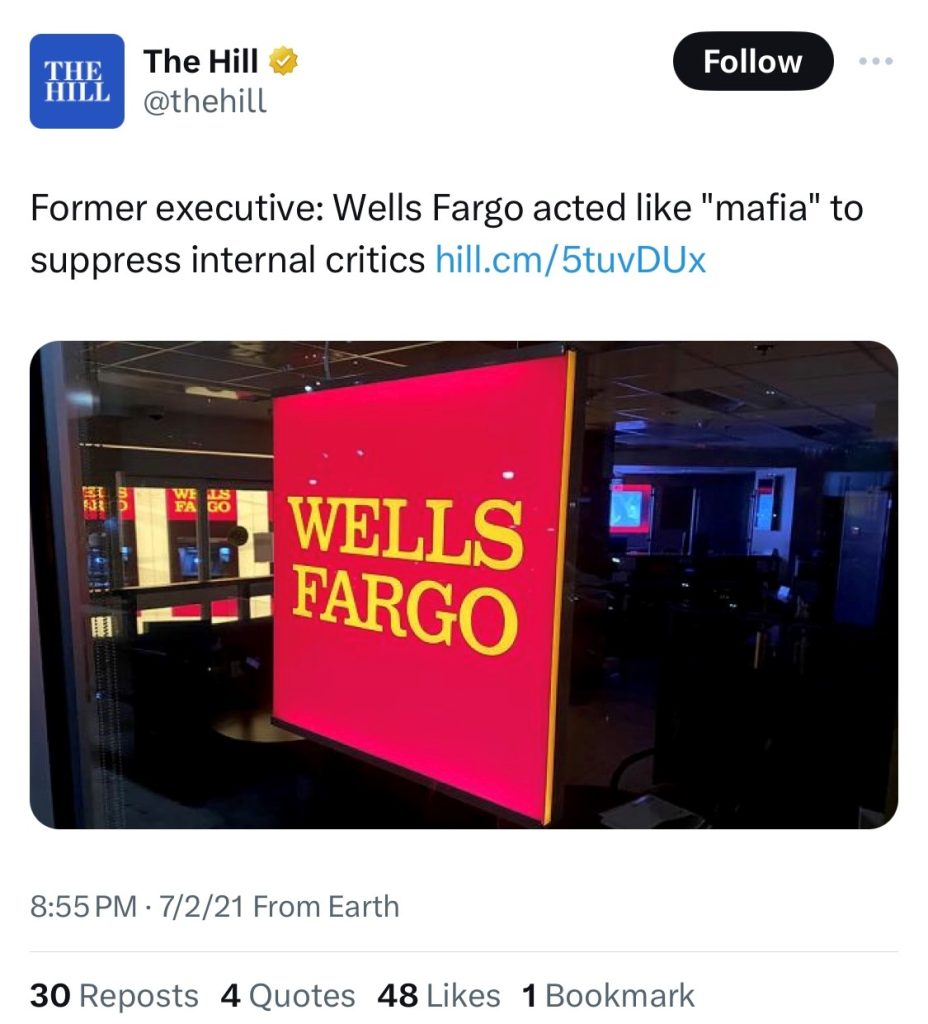
Yet PRSA’s National Board and its separate Board of Ethics & Professional Standards (BEPS) in 2018 let the whole thing slide.
Any competent PRSA leader fully knew that bestowing a vaunted Gold Anvil to a Wells Fargo PR guy in the midst of such a scandal — which truly harmed so many innocent people — sent a larger, damaging message… that corporate misconduct of this magnitude was, in PRSA’s apparent estimation, really no big ethics problem meriting a rethink.
BEPS’s own chairperson even tweeted delighted congratulations to Mr. Wells Fargo on his Gold Anvil trophy… as if there was nothing cringe-y whatsoever about this whole twisted scenario. In fact, she didn’t find it “curious” in the least:
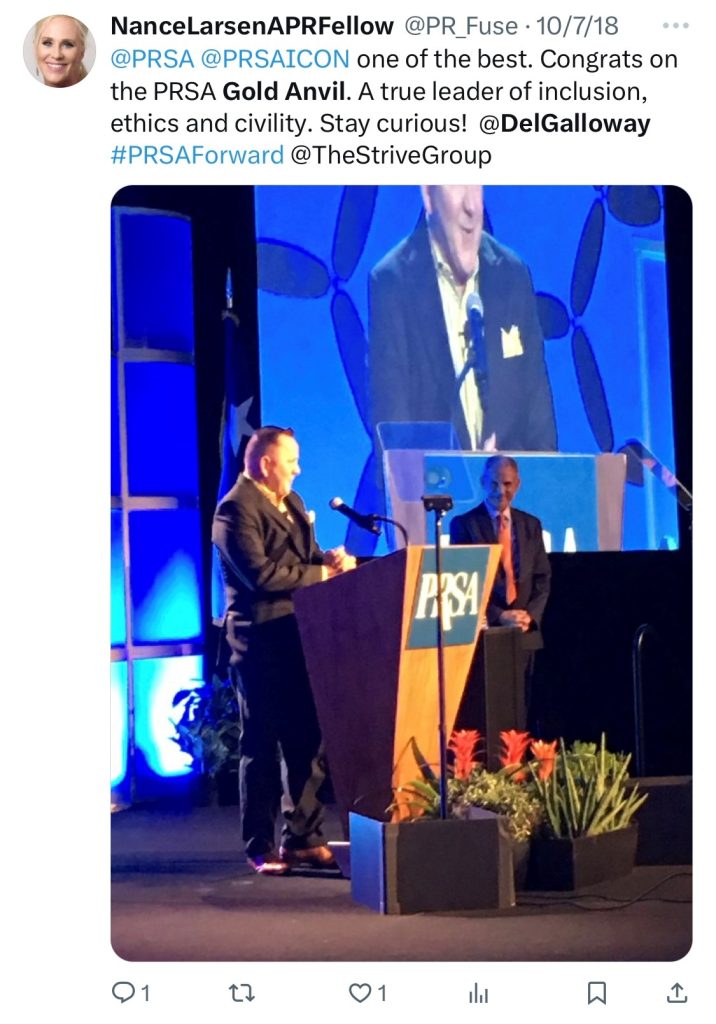
The BEPS chair also was abundantly aware of these aforementioned issues, due to my copious reports in real-time… which, of course, were ignored, and resulted in retaliation against me, instigated in part by none other than Mr. Wells Fargo himself.
Which brings me to the fifth gap in PRSA’s Code of Ethics:
5. PRSA’s Code includes no provisions for 1) protection of whistleblowers of observed misconduct or 2) anti-retaliation requirements.
Instead, the PRSA Code of Ethics mandates “loyalty” to employers / clients – or else you’re violating PRSA’s Code! – even if employers / clients themselves are violating actual laws or harming “the public interest.”
In other words, PRSA’s Code places more value on being “loyal” to employers or clients than in speaking up against obvious wrongdoing.
For example, PRSA’s rather infamous “Safeguarding Confidences” provision makes clear — in no uncertain terms — that if a PR practitioner notifies government law enforcement that their employer is engaged in law-breaking misconduct, then it’s the PR practitioner who’s the ethics violator, not the employer.
Further, whether purposely or not, PRSA’s Code also instructs PR practitioners that if they discover a whistleblower in their midst who is “divulging” the “confidential information” of an employer’s misconduct, they’re essentially supposed to snitch on them.
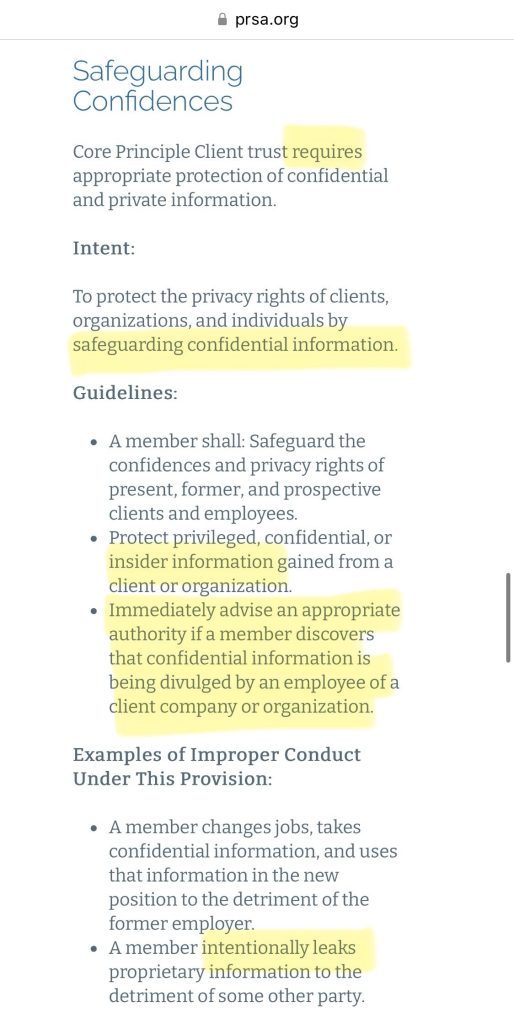
I’m sure the above “Safeguarding Confidences” bit of PRSA’s Code originally was written back in 2000 with a different lens of intent, which is all fine and well.
However, what PRSA now offers here — intentionally or not — is license for PR practitioners to engage in wholesale whistleblower retaliation and toxic cultures of “kill the messenger,” whenever internal misconduct is observed.
And that’s precisely how PRSA, Inc., has behaved toward me, just as Wells Fargo behaved (illegally) toward its own internal whistleblowers:
As PRSA, Inc., has made abundantly clear through its own choices, it’s deemed “ethical” to promote, defend, and deflect for wackadoodle management cultures…. like “PR-ing” for Wells Fargo that fakes millions of client accounts and then pressures / punishes its own employees who rightfully protest these practices; or a major airline manufacturer that systemically de-prioritizes product safety, arguably resulting in hundreds of people getting killed when its planes fall out of the sky.
It’s all good, per PRSA, as long as you’re being “loyal” and “safeguarding” secrets.
The PRSA Code makes little distinction that PR people should be disallowed ethically to sacrifice “the public interest” out of a duty of “loyalty” to an utterly rotten employer or client or… PRSA crony, for that matter.
This gap provides an ethics loophole big enough to fly a Boeing Dreamliner through it.
Further, the PRSA Code of Ethics is incompatible with member-expulsion provisions of PRSA member bylaws.
The PRSA Code includes a “guideline” to “Report practices that fail to comply with the Code, whether committed by PRSA members or not, to the appropriate authority.”
But as I learned first-hand, if a PRSA member observes documented PRSA, Inc. leadership misconduct (as I did on countless occasions), reporting it privately to PRSA leadership can prove to be a fool’s errand, in terms of forcing the misconduct to cease. In fact, in my experience, said misconduct only grew worse, the more it was reported.
Those in leadership committing the misconduct (like PRSA’s 2017 and 2018 Chairs) saw to it that PRSA’s bylaws were changed in 2018 (literally days before handing Mr. Wells Fargo his Gold Anvil).
The goal: to be able to prosecute in PRSA’s own custom-made kangaroo courts any innocent rank-and-file PRSA members perceived to harm PRSA’s own precious “reputation” by having actually followed the PRSA Code by reporting observed misconduct.
Got that?
Thanks to this 2018 bylaws switcheroo, PRSA now defines that a “member in good standing” of PRSA must “not engage in any activities or behaviors that put the Society in financial or structural jeopardy, or that will bring discredit to the Society…”
Their bylaws also state that PRSA leadership can “suspend, terminate, expel or otherwise reasonably discipline any member for cause. ‘Cause’ means… engaging in conduct that causes or may cause material harm to the Society, including to the reputation, mission, or operations of the Society…”
Got that?
“Loyalty” to PRSA’s “reputation” trumps everything else, in PRSA Land.
These bylaw provisions don’t exactly scream:
“If we in PRSA leadership are engaged in documented misconduct, then please, Members – PLEASE! – report our misconduct ‘to the appropriate authority,’ because doing so will never in a million years result in our attacking or exiling YOU or harming your career, as per our now very conveniently worded bylaws.”
Many people in the PR industry wonder why I’m so cynical about PRSA.
Well – now you know.
This level of duplicity never ceases to amaze me… that certain PRSA National leaders have wrought such highly contrived “governance” bylaws onto the membership, while utterly ignoring and neglecting an Ethics Code that many rank-and-file PRSA members actually want to pay attention to and integrate into ethical work.
Again, putting all this factual history aside, the bottom line is this:
PRSA needs to change culturally… not just its Ethics Code.
It needs bylaws and an Ethics Code that are current, contemporary, law-abiding, law-affirming, and that place the public’s interests and its members’ interests ahead of current or past PRSA National leadership’s own self-serving, self-preservation interests.
It will be interesting to see if it ever happens, or, if PRSA’s vice-like grip on the status-quo means that in 2025, PRSA’s “silver anniversary” Ethics Code milestone might be etched metaphorically on an organizational tombstone.
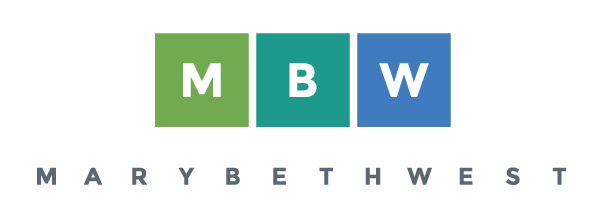
[…] was an automatic “ethics” infraction on my part — although PRSA’s actual Code of Ethics states nothing of the sort of PRSA being “above the law” or “untouchable” […]